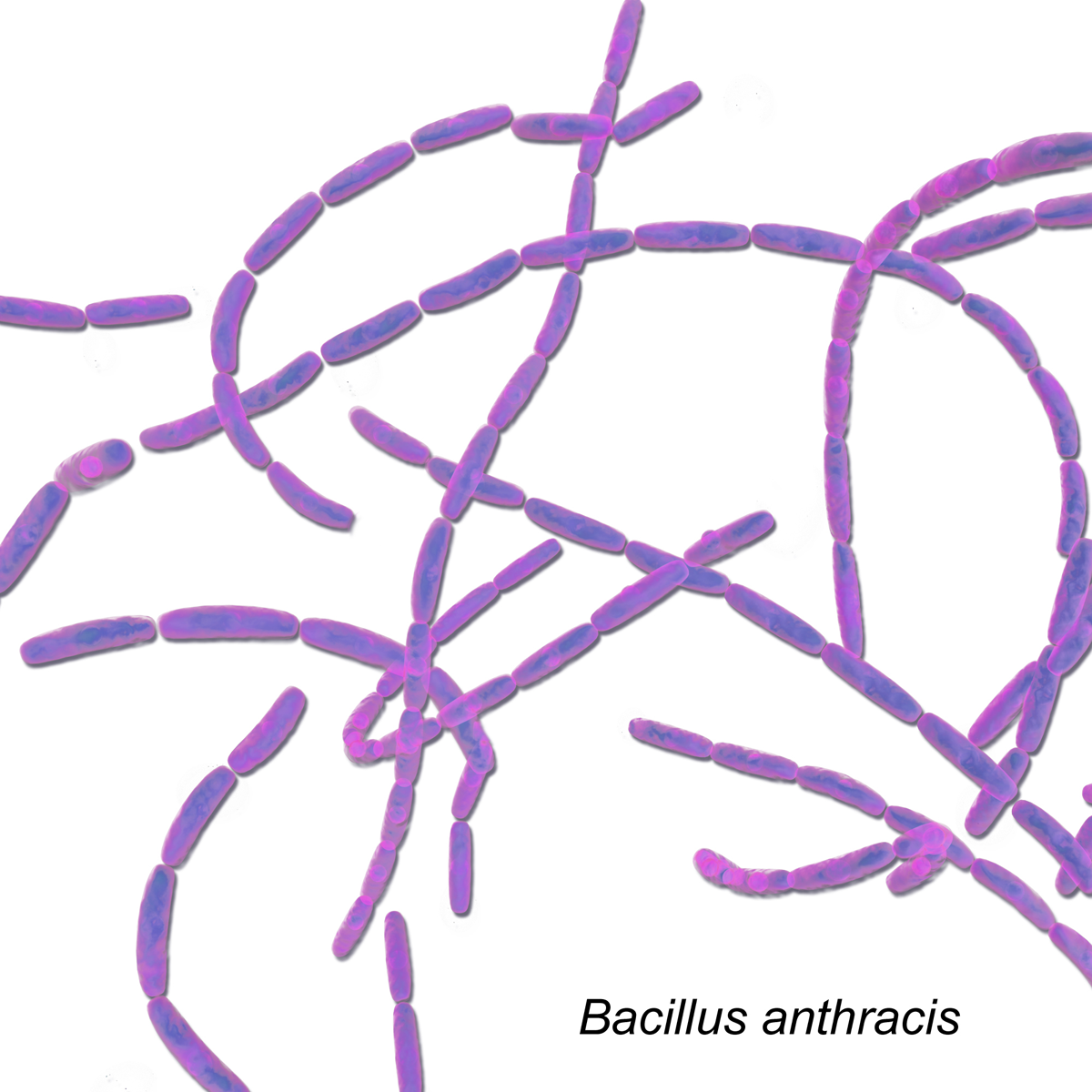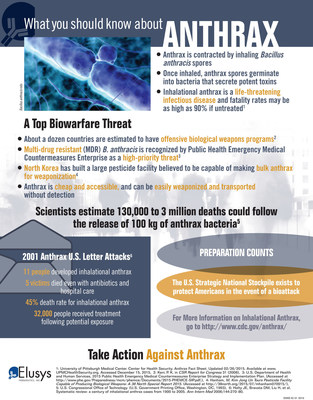
Anthim (obiltoxaximab)
ETI-204
March 21, 2016
On Friday, March 18, the U.S. Food and Drug Administration approved Anthim (obiltoxaximab) injection to treat inhalational anthrax in combination with appropriate antibacterial drugs. Anthim is also approved to prevent inhalational anthrax when alternative therapies are not available or not appropriate.
Inhalational anthrax is a rare disease that can occur after exposure to infected animals or contaminated animal products, or as a result of an intentional release of anthrax spores. It is caused by breathing in the spores of the bacterium Bacillus anthracis. When inhaled, the anthrax bacteria replicate in the body and produce toxins that can cause massive and irreversible tissue injury and death. Anthrax is a potential bioterrorism threat because the spores are resistant to destruction and can be spread by release in the air.
“As preparedness is a cornerstone of any bioterrorism response, we are pleased to see continued efforts to develop treatments for anthrax,” said Edward Cox, M.D., M.P.H, director of the Office of Antimicrobial Products in FDA’s Center for Drug Evaluation and Research.
Anthim is a monoclonal antibody that neutralizes toxins produced by B. anthracis. Anthim was approved under the FDA’s Animal Rule, which allows efficacy findings from adequate and well-controlled animal studies to support FDA approval when it is not feasible or ethical to conduct efficacy trials in humans.
Anthim’s effectiveness for treatment and prophylaxis of inhalational anthrax was demonstrated in studies conducted in animals based on survival at the end of the studies. More animals treated with Anthim lived compared to animals treated with placebo. Anthim administered in combination with antibacterial drugs resulted in higher survival outcomes than antibacterial therapy alone.
The safety of Anthim was evaluated in 320 healthy human volunteers. The most frequently reported side effects were headache, itching (pruritus), upper respiratory tract infections, cough, nasal congestion, hives, and bruising, swelling and pain at the infusion site.
Anthim carries a Boxed Warning alerting patients and health care providers that the drug can cause allergic reactions (hypersensitivity), including a severe reaction called anaphylaxis. Anthim should be administered in settings where patients can be monitored and treated for anaphylaxis. However, given that anthrax is a very serious and often deadly condition, the benefit of Anthim for treating anthrax is expected to outweigh this risk.
Anthim was developed by Elusys Therapeutics, Inc. of Pine Brook, New Jersey, in conjunction with the U.S. Department of Health and Human Services’ Biomedical Advanced Research and Development Authority.
Obiltoxaximab is a monoclonal antibody designed for the treatment of exposure to Bacillus anthracis spores (etiologic agent ofanthrax).[1]
This drug was developed by Elusys Therapeutics, Inc.
ANTHIM (obiltoxaximab) Data
The efficacy of ANTHIM for treatment and prophylaxis of inhalational anthrax was demonstrated in multiple studies in the cynomolgus macaque and NZW rabbit models of inhalational anthrax. These studies tested the efficacy of ANTHIM compared to placebo and the efficacy of ANTHIM in combination with antibacterial drugs relative to the antibacterial drugs alone. The primary endpoint was survival following challenge with B. anthracis.
Two studies in NZW rabbit and two studies in cynomolgus macaques evaluated treatment with ANTHIM 16mg/kg IV single dose compared to placebo in animals with systemic anthrax. Treatment with ANTHIM alone resulted in statistically significant improvement in survival relative to placebo in both species. Survival rates were 93% and 62% with ANTHIM compared to 0 placebo survivors in rabbits, and 47% and 31-35% survival with ANTHIM compared to 6% or 0% placebo survival in macaques.
ANTHIM administered in combination with antibacterial drugs (levofloxacin, ciprofloxacin and doxycycline) for the treatment of systemic inhalational anthrax disease resulted in higher survival outcomes than antibacterial therapy alone in multiple studies where ANTHIM and antibacterial therapy was given at various doses and treatment times.
ANTHIM administered as prophylaxis resulted in higher survival outcomes compared to placebo in multiple studies where treatment was given at various doses and treatment times. ANTHIM administered as prophylaxis resulted in higher survival outcomes compared to placebo in multiple studies where treatment was given at various doses and treatment times. In one study, cynomolgus macaques were administered ANTHIM 16 mg/kg at 18 hours, 24 hours or 36 hours after exposure. Survival was 6/6 (100%) at 18 hours, 5/6 (83%) at 24 hours, and 3/6 (50%) at 36 hours. Another cynomolgus macaque study evaluated ANTHIM 16 mg/kg administered 72, 48 or 24 hours prior to exposure. Survival was 100% at all three time points (14/14, 14/14, 15/15, respectively) at day 56 (end of study).
Elusys Therapeutics
Elusys Therapeutics, Inc., a private company based in Pine Brook, NJ, is focused on the development of antibody therapeutics for the treatment of infectious disease.
In November 2015, Elusys was awarded a $45M delivery order from the U.S. government to produce ANTHIM® for the U.S. Strategic National Stockpile (SNS), the U.S. government’s repository of critical medical supplies for public health emergency preparedness. Elusys has received grants and contracts from the USG totaling over $240 million to support ANTHIM’s development.
In March 2016, ANTHIM (obiltoxaximab) Injection, the company’s monoclonal antibody (mAb) anthrax antitoxin, received approval from the U.S. Food and Drug Administration (FDA) for the treatment of adult and pediatric patients with inhalational anthrax due toBacillus anthracis in combination with appropriate antibacterial drugs, and for prophylaxis of inhalational anthrax due to B. anthracis when alternative therapies are not available or not appropriate. ANTHIM should only be used for prophylaxis when its benefit for prevention of inhalational anthrax outweighs the risk of hypersensitivity and anaphylaxis. The effectiveness of ANTHIM is based solely on efficacy studies in animal models of inhalational anthrax. There have been no studies of the safety or pharmacokinetics (PK) of ANTHIM in the pediatric population. Dosing in pediatric patients was derived using a population PK approach. ANTHIM does not have direct antibacterial activity. ANTHIM should be used in combination with appropriate antibacterial drugs. ANTHIM is not expected to cross the blood-brain barrier and does not prevent or treat meningitis.
| Latest Stage of Development | Approved |
| Standard Indication | Anthrax |
| Indication Details | Treat and prevent anthrax infection; Treat anthrax infection |
| Regulatory Designation | U.S. – Fast Track (Treat and prevent anthrax infection); U.S. – Orphan Drug (Treat and prevent anthrax infection) |
References
- Statement On A Nonproprietary Name Adopted By The USAN Council – Obiltoxaximab, American Medical Association.
| Monoclonal antibody | |
|---|---|
| Type | ? |
| Source | Chimeric (mouse/human) |
| Target | Bacillus anthracis anthrax |
| Clinical data | |
| Trade names | Anthim |
| Identifiers | |
| CAS Number | 1351337-07-9 |
| ATC code | none |
| ChemSpider | none |
| Chemical data | |
| Formula | C6444H9994N1734O2022S44 |
| Molar mass | 145.5 kg/mol |
///////////Anthim, obiltoxaximab, fda 2016, Orphan Drug,












